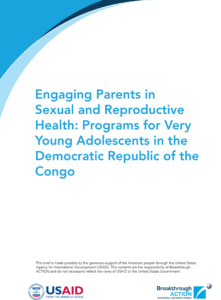Engaging parents and other caregivers to create a supportive environment is a key component of successful very young adolescents (VYA) programs. A recent global review of parenting programs found that improved parent-child communication was the most important determinant of improvements in other adolescent well-being outcomes.[i] Parent and caregiver involvement is particularly essential for programs that aim to shift or promote more equitable gender and social norms. Such programs must intervene at multiple levels and be rooted in local values to achieve the positive social change they seek.[ii]
Breakthrough ACTION produced this document, Engaging Parents in Sexual and Reproductive Health [ English | French ], to share key learnings from a human-centered design process with VYAs in the Democratic Republic of the Congo that suggests three key implications for programs and policies:
- Invest in activities that bring families and communities together to address gender norms.
- Explore game-based solutions.
- Integrate activities into existing community-based health platforms and organizations.
VYA Pilot Package
Related Resources
- Addressing Gender Inequity During Early Adolescence in Indonesia: Implications for Programs and Policies from a Human-Centered Design Process
- Creating a Gender-Equitable Environment for Very Young Adolescents: Messages and Evidence to Persuade Decision Makers
- Design & Test Reports from Indonesia and the Democratic Republic of the Congo
- Leveraging Human-Centered Design to Improve Gender-Equitable Adolescent Programming in the DRC and Indonesia: Process Brief and Learnings
References
[i] Marcus, R., Kruja, K. and Rivett, J. (2019) What are the impacts of parenting programmes on adolescents? A review of evidence from low and middle-income countries. London: Gender and Adolescence: Global Evidence.
[ii] Yaker, R. 2017. Background Paper: Identifying and Describing Approaches and Attributes of Normative Change Interventions. Learning Collaborative to Advance Research and Practice on Normative Change for Adolescent Sexual and Reproductive Health. Institute for Reproductive Health, Georgetown University.
LEARN MORE
ENGLISH


